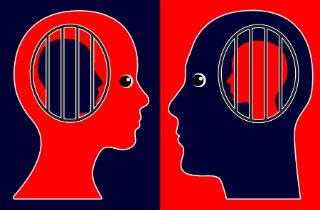Dealing with an addict who is choosing drug or alcohol is extremely difficult. So how can you adapt a positive outlook if you find yourself in a co-addiction relationship? Here, we examine ways to address codependent behaviors, including obsession so that you can take back control of your psycho-emotional state. We invite your questions and comments at the end.
Codependency: Total loss of control
It was 5 am on a Saturday morning. My husband had been gone since Thursday. I had slept a total of three hours and my daughter was going to wake soon. In the span of forty-eight hours; I called my husband eighteen times, left him two messages, texted him five times, checked his emails and Facebook with his passcode, and checked online to see if I could review up-to-the-minute, his call log on our cell phone account. When I was not pretending to my daughter that everything was fine, I was pacing the floor, drinking coffee, smoking cigarettes (and I was not a smoker) wondering every minute where he was, and carrying around a knot in my gut. What I was not doing was eating, sleeping, being a good mother, running errands, chores, accomplishing work that needed to be done, or feeling happy and productive.
I am almost positive that my husband was not preoccupying himself with my worry. In fact, he was probably at a party, where the drugs had let him forget my daughter and I even existed.
Obsession Is a Dynamic of Addictive Behavior
A big part of co-addiction is obsession. Fixating on things is part of addictive behavior. When you are in the thick of co-addictive behavior—it feels like someone is twisting your intestines and something subhuman is making you do things and feel things you never thought possible. You are compelled to figure out what the other person is doing. What is driving you is an unknown force.
When something terrible is happening to the addict, you feel as torn as if it were happening to you. Obsession grows and festers inside you until the ugliness within you surfaces. Obsession is something you know you don’t want—but becomes a need. A co-addict may rationalize or conceal obsession as passion or caring, but, nonetheless, these intense feelings are almost always associated with co-addiction and are almost always self-destructive.
How can you address control issues?
There is no person that can break you from these feelings as they are unfolding. Much like drug addicts like to associate with other addicts, a co-addict wants to talk to people who will enable their obsession and make them feel justified for their behavior—because after all, the addict, could be in danger. The crisis causes co-addicts to go into disaster mode and when these disasters, inevitably, become more and more frequent, self-care becomes secondary.
Obsession is part of the addictive behavior co-addicts exhibit. When you learn to accept that the constant worry, anxiety over, and concern for a loved one is not healthy, it can become less scary to let the addict go and focus on getting your own life back. Breaking obsessive patterns will help you move on to a healthier you and establish more nourishing relationships in the future.









Related Posts